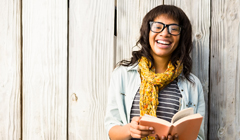- Jenna Hollenstein
- Are You There God? It’s Me, Jenna

 If you were an American girl growing up in the 70s and 80s, you probably read Are You There God? It’s Me, Margaret. Judy Blume’s quintessential coming of age story focuses on the sixth-grade Margaret, as she deals with boobs, bras, boys, and first periods. Because Margaret’s Christian mom and Jewish dad choose not to bring her up in a particular faith – instead offering her the option of finding her own way – Margaret becomes obsessed with her relationship with God, exploring the faith and religious beliefs of those around her and having a series of conversations with Him that begin, Are you there God? It’s me, Margaret.
If you were an American girl growing up in the 70s and 80s, you probably read Are You There God? It’s Me, Margaret. Judy Blume’s quintessential coming of age story focuses on the sixth-grade Margaret, as she deals with boobs, bras, boys, and first periods. Because Margaret’s Christian mom and Jewish dad choose not to bring her up in a particular faith – instead offering her the option of finding her own way – Margaret becomes obsessed with her relationship with God, exploring the faith and religious beliefs of those around her and having a series of conversations with Him that begin, Are you there God? It’s me, Margaret.
As a girl, I also took my relationship with God very seriously. I prayed every night on the silver and blue crystal rosary given to me by my Nani. She told me it contained a drop of holy water that had been blessed by the Pope himself, and I kept the beads under my pillow.
After listening to a particular homily, I took care not to just ask for things in my prayers. Instead, I thanked God for what I had, for the health of my family, and to care for those less fortunate. I went to church every Sunday, was christened, attended CCD (Catholic religious education), received first communion, and was later confirmed.
I loved the fact that the church had an answer for everything. Back then, many of those answers rang true. Love thy neighbor, turn the other cheek, blessed are the meek…To a confused and fearful 10-year-old, this kind of certainty was literally the answer to my prayers.
At the same time, I had some questions. Listening to the story of Adam and Eve, I’d narrow my eyes at the people in the nearby pews and wonder, Are any of you buying this? Even with my most strenuous willing suspension of disbelief, it was a hard pill to swallow. But I was willing to overlook it because of the security offered by such dogma.
More troubling to me was the concept of original sin. How could every person, from the time of his or her birth, already be guilty of some grave wrongdoing? And didn’t anyone find it suspicious that only the church (this church and no other) could offer redemption (and while we’re at it, eternal life)? The accuser becomes the savior? Here I learned that I was born bad and would spend my life striving to be better.
As I grew older and more aware, my misgivings with the church extended beyond the story of creation. Other doctrine grated on me and smacked more of a desire to control than to inspire the masses. Masturbation – bad. Sex before marriage – bad. Homosexuality – bad. For a bunch of old men who [allegedly] never had sex, they sure had a lot of opinions about it. And didn’t they realize that people – dare I say, even women – could think for themselves and make choices that were right for them?
Don’t even get my 10-year-old self started on the idea that not all dogs go to heaven! Maybe the church didn’t have the answers after all? At least not for me.
In my late teenage years I stopped going to church, stopped praying to God, and for many years wandered about without any spiritual path. I couldn’t practice the faith in which I was raised and everything else seemed like someone else’s religion.
My lack of spirituality left a palpable void and a direction was unclear. Plagued by life’s uncertainties, restlessness often gripped me and would not let go; I felt the need to be doing something else, to be somewhere else, even to be someone else. But what, where, and who?
One of the ways I dealt with this – and much of what I’ve written about here – was by drinking. It filled the hours and offered me a break from discomfort and fear. When I finally quit, the discomfort was still there but I managed for almost 3 years without medicating it.
Then, about a year ago, I decided to try meditating. I’ve described my initial experiences before and have shared some of the readings I found particularly poignant. Essentially, meditation offered me a way of existing in the world – the same me that felt terribly afraid and directionless – and remain somewhat stable.
At this point in my life, the wisdom I’ve gained from various Buddhist and meditation books – and from my teacher – just makes sense. It doesn’t prescribe who to be or how to live but to find out for myself by asking questions and trying out each teaching to see if it works in my life. Here is a small sampling:
On inherent goodness and ceasing the endless cycle of self-improvement from Susan Piver’s How Not To Be Afraid of Your Own Life:
Remember, we were born without fear and have a natural ability to love. Returning to our inborn fearless state requires unlearning certain things, not acquiring new skills. We don’t have to become daring where we’re risk-averse, calm when we’re anxious, or self-loving if we have self-doubt. Instead we can relax. We can learn how to be who we already are, honestly, unapologetically, and intelligently, embracing everything that’s wonderful about our life and everything that’s a mess.
On being in the moment from Pema Chodron’s Comfortable with Uncertainty:
In practicing meditation, we’re not trying to live up to some kind of ideal—quite the opposite. We’re just being with our experience, whatever it is…’This very moment is the perfect teacher’ is really a most profound instruction. Just seeing what’s going on—that’s the teacher right there. We can be with what’s happening and not dissociate. Awakeness is found in our pleasure and our pain, our confusion and our wisdom. It’s available in each moment of our weird, unfathomable, ordinary everyday lives.
On having compassion even when it’s supremely inconvenient, from Pema Chodron’s The Places That Scare You:
In the fifth stage [of practicing compassion], when we generate compassion for the difficult people in our lives, we get to see our prejudices and aversions even more clearly. It can feel completely unreasonable to make a compassionate wish for these irritating, belligerent people. To wish that those we dislike and fear would not suffer can feel like too big a leap. This is a good time to remember that when we harden our heart against anyone, we hurt ourselves. The fear habit, the anger habit, the self-pity habit—all are strengthened and empowered when we continue to buy into them. The most compassionate thing we can do is to interrupt these habits. Instead of always pulling back and putting up walls, we can do something unpredictable and make a compassionate aspiration.
On not fearing uncertainty, from Chogyam Trungpa’s Shambhala: The Sacred Path of the Warrior:
The warrior, fundamentally, is someone who is not afraid of space. The coward lives in constant terror of space. When the coward is alone in the forest and doesn’t hear a sound, he thinks there is a ghost lurking somewhere. In the silence he begins to bring up all kinds of monsters and demons in his mind. The coward is afraid of darkness because he can’t see anything. He is afraid of silence because he can’t hear anything. Cowardice is turning the unconditional into a situation of fear by inventing reference points, or conditions, of all kinds. But for the warrior, unconditionality does not have to be conditioned or limited. It does not have to be qualified as either positive or negative, but it can just be neutral—as it is.
At the end of Are You There God? It’s Me, Margaret, while she’s only begun to figure things out for herself, our heroine receives a sign from God that basically she’s going to be OK.
Though I’m only beginning to learn about Buddhism, I too know I’m going to be OK. I haven’t yet made a formal commitment to this path – though I sense that is in my future – but what I’ve learned has already opened up my eyes (and heart) and helped me to begin again…and again.
Writing Status Badges












Writing Status Badges












Featured Members (7)
Writing Status Badges












































